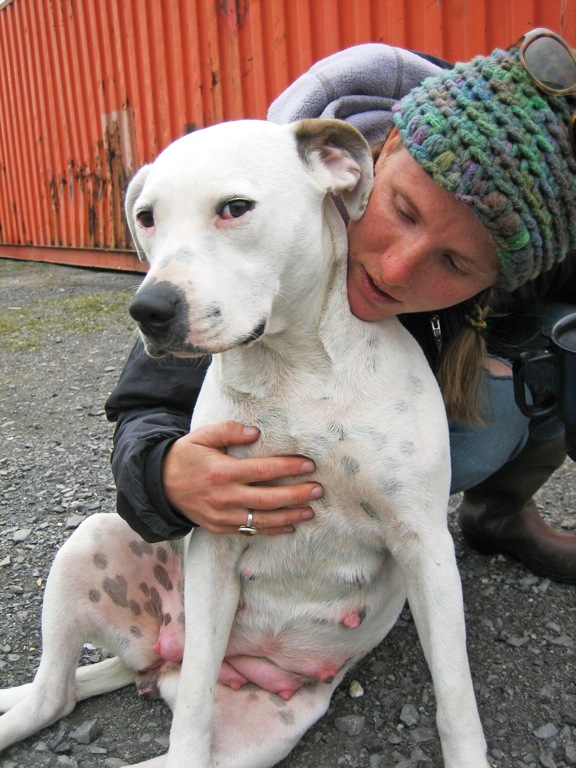The Road to Waveland
Open gallery

by Valisa Higman ‘02
Less than a week after Katrina made landfall, I was observing the one-year anniversary of my husband’s death. Jura died outside, under a big sky, doing what he loved: hiking.
On the side of a mountain overlooking the Vail Valley in Colorado, I sat with friends and cried. As I looked out at the majesty of the mountains and felt Jura’s presence in the fields below, I knew it was time to make choices and move forward. Plans are important, I thought, even if you change them and break them and forget them. So I began making plans.
But a simple e-mail, forwarded by a friend, sent my life on a tangent. It was from a woman who had just left Waveland, Mississippi–ground zero for Katrina–and it described a unique independent relief effort that was in desperate need of volunteers and supplies. As the world watched a second hurricane hit the Gulf Coast, I packed my backpack. Two days later, I was in a van with complete strangers on the road to Waveland.
Seven months later, I write from a van in St. Bernard Parish, Louisiana. My laptop sports candle burns; my fingers are mosquito bitten. Waveland, where it all began, seems a distant memory. It is a collage of faces, stories, the smell of rotten potatoes, and flies in my face. It is sweat between my shoulder blades, and the first time someone broke down crying in my arms. It is the sweetest thanks I ever received–a rose painted on the back of a book from Ravalee of Waveland, who lost everything in the storm except her paints and a few brushes.
It grabbed me from the start, the feeling that I could plunge my hands into a tub of dishwater and help a thousand people. I could chop carrots or peel garlic and make an old man sigh in relief. As Waveland began to recover, I felt my work on the Gulf Coast wasn’t finished. This was the easiest hardest work I had ever done: long hours, substandard conditions, too hot, too cold, and every day a meal served, a smile offered, a hug given from another exhausted volunteer.
I wasn’t the only one who still felt the need to provide grassroots, flexible, community-based relief to those devastated by Hurricane Katrina, so we took our places as the founders of a new nonprofit: Emergency Communities. Conceived in the dish pit of the New Waveland Café and born in New York City as a project of the International Humanities Center, EC is a nonprofit with no religious or political affiliations. Our goal is to go beyond simple sustenance to holistically nourish disaster survivors, providing them with hot, home-style meals and a friendly open community space to gather.
In December, I traveled with the first handful of EC volunteers to New Orleans’ St. Bernard Parish, where we launched our first kitchen under our new banner. We set up camp, and people came to us for food and supplies. They also came to us for comfort and support. None of us entered the fray with the idea of starting something like this. Most of us don’t even know exactly what it is we’ve started. Maybe this is a revolution, a change in the way disaster relief is done. Maybe this is a training ground for community organizers around the country. Maybe this is family. Maybe this is just a kitchen.
As for me, this has been an awakening. I approach each day with a sense of purpose, and live my life with no regrets. I want to give people the opportunity I have had–to volunteer and make a difference–and I hope our story inspires other people to start nonprofits or to join us in making ours better. I have gone through hardship, and I know that the best thing in the world is a community of caring, loving people, and that is what I want to offer for people who are suffering loss.
At Lewis & Clark, I learned to be an activist. I learned to disagree and to work toward social change. I signed petitions, held signs, and marched in the streets with my fist in the air. But I began to lose heart. My voice grew quieter because I felt that the more I yelled, the more intensely the opposition felt I was wrong. I saw myself making higher walls, wider moats, stronger gates, and there was little, if any, exchange of ideas.
Here in St. Bernard, I finally feel like the other side is listening, and it’s because I am not telling. Service is activism. I don’t have to say a word, and I don’t have to hold up a sign. I just need to be here and help people without judgment, and they won’t judge me. In fact, they might even ask me what I think.
More L&C Magazine Stories
Lewis & Clark Magazine is located in McAfee on the Undergraduate Campus.
MSC: 19
email magazine@lclark.edu
voice 503-768-7970
fax 503-768-7969
The L&C Magazine staff welcomes letters and emails from readers about topics covered in the magazine. Correspondence must include your name and location and may be edited.
Lewis & Clark Magazine
Lewis & Clark
615 S. Palatine Hill Road MSC 19
Portland OR 97219

